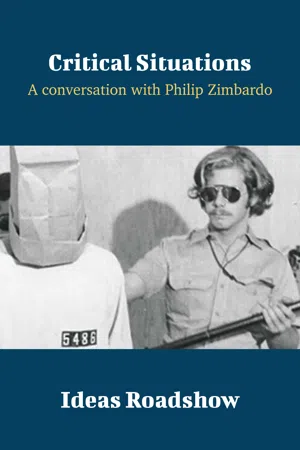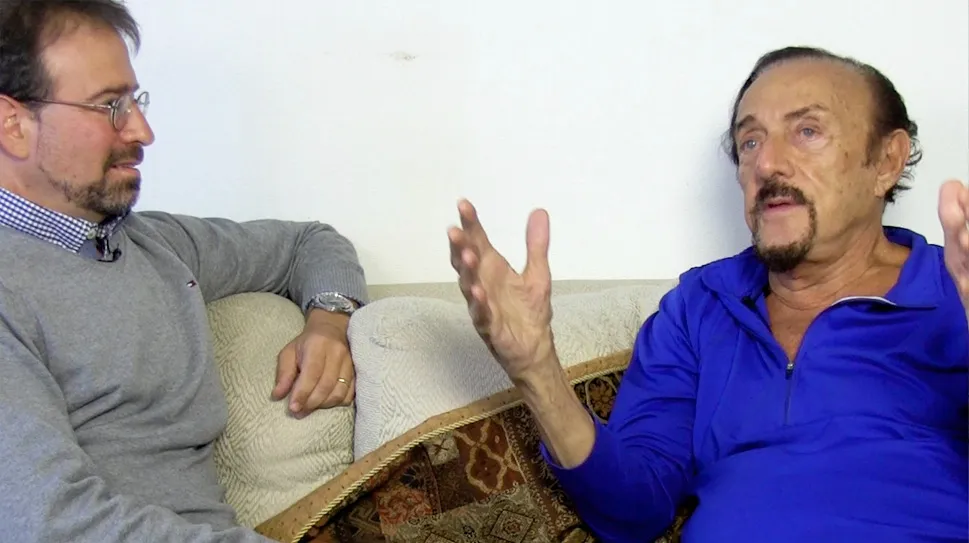![]()
The Conversation
![]()
I. Origins
Humble beginnings
PZ: My life began in the South Bronx, New York City, in 1933, during the Great Depression. I was born to George and Margaret Zimbardo, who were lovely parents. They were uneducated—neither of them even went to high school, let alone graduated from it. They were both of Sicilian background; their parents had immigrated to the United States from small towns in Sicily.
Both came from big families—my mother’s family had 11 children, my father’s family had 10 children. As in many Italian and Sicilian families, family was the core. There were four children in my family. I was the oldest, and I had two brothers and a sister.
But we were very poor. My mother’s father was a shoemaker who had a shop in the Northern Bronx that I visited on occasion. In my father’s family they were all barbers—my grandfather, uncles, and cousins. That was my father’s trade too, but he hated it.
He should have been a prince. He was very handsome and very elegant. He was the first son after seven sisters, which meant that he was spoiled rotten. Even when he was an adult, his sisters would call him Giglio, which roughly translates to “little George”.
Although he was totally uneducated academically, he was a genius in many ways. He was very musically gifted. He could play many instruments by ear—piano, violin, guitar, mandolin, especially. He could listen to a song—the theme from The Godfather, say—and, in 30 minutes he would be playing it.
HB: He probably never had any formal musical training either.
PZ: None whatsoever, as far as I know. He almost had perfect pitch.
In addition to that, he also had incredible mechanical abilities. He could make almost anything and would repair cars or broken radios. In fact, the only time he ever made money was during the Second World War when he opened a radio shop. You couldn’t buy new radios at that time, so the only thing people could do was fix their old tube ones. He opened a radio store in the Bronx and we started to become better off.
He didn’t want to be a barber, because he thought barbers were like servants because they wait on people. He thought people should be waiting on him, as his sisters had done. One day, he just quit and said, “I’m not going to be a barber any more.” Then, for a long period of time he did nothing, until he opened the radio store several years later.
We had a family of four and we were on what was called “Home Relief”. But he didn’t care. My father’s main personality trait is what I would call complacence. He was happy with his life, whereas my mother would be crazy because we had no money. I don’t know what you got from Home Relief, maybe $60 a week for four kids. Money was always a big issue. We never had enough.
I had an uncle, George—my mother’s older brother—who was a bachelor and lived nearby. We were like his substitute family. He would come several times a week and bring us doughnuts, pastries, newspapers and so forth. He even set up a credit account at Charlie’s Candy Store where we could each spend five cents a week, or something like that. So we always felt privileged because someone was looking after us, even though we were essentially poor.
We lived within our means—which meant, for example, you had pasta three times a week—big pasta with meatballs on Sunday, pasta with fish or just oil on Friday, and some other pasta on Wednesday. It was all good and fresh. None of us were ever fat. We were never over-nourished.
One thing my father did which was truly extraordinary was build a television set. The first television set was invented in 1946; and in 1947 he built his own TV from a wiring diagram, from scratch, entirely on his own. In 1947, we saw the World Series on an 8-inch screen and actually charged 25 cents to let people watch it with cookies and lemonade.
Another brilliant thing he did was to get a parabolic magnifying glass and put it right in front of the television, so you could see the picture—albeit slightly distorted—from all angles. Of course everybody said, “George, I want one. Can you make me one?” And he said, “No, the challenge was to make one.” I pleaded with him, “Dad, we could help here. Everybody wants one and we could really use the money.” But, he just said, “The challenge was to make one, and that’s it.”
HB: It was just for himself.
PZ: Yes, it was just a challenge for himself.
Another thing he used to do was buy old pianos and totally remodel them—refinish them, put French legs on them, put mirrors in front, sometimes emboss them with “George Zimbardo & Sons” in gold. Again, of course, people would ask, “George, could you do that for me?” And he would say, “No, no. I did one. That’s enough.” That made me crazy.
That’s partly how I became interested, later in life, in the psychology of time perspective. My father lived in what I would call “the expanded present.” He lived for the moment. He never thought about the future. He was content. He was satisfied with what he had.
HB: He probably didn’t think about the past very much either.
PZ: Not at all. The past didn’t exist to him. He never talked about the old ways; it was always a question of how to enjoy the present. He was obviously desirable at parties—he could sing, apparently he was a great dancer, he could tell stories, he could tell jokes, and he was charming. But he didn’t fit as the father of a family of four.
My parents made a mistake—obviously, they got married too soon. My mother was very attractive—which, again, was probably part of his present-oriented perspective. They made love, had a baby, and all of a sudden he had to play the father role.
HB: I’m guessing that your mother didn’t live in the expanded present. Presumably she couldn’t afford to.
PZ: She never did. Her thing was, “Life goes on.” For her, life was about suffering until someday it’ll get better. That was sad for me. As the oldest child, I was often the husband surrogate. If my father didn’t come home until late, I would stay up with my mother listening to radio programs. We’d listen to Bob Hope and she’d tell me what the double entendres meant, these semi-sexual jokes, and that sort of thing. As a result, I essentially grew up faster than my age; and very often I would be instructed to take care of my younger brothers.
HB: So you were also a father surrogate, to some extent.
PZ: I was a father surrogate to my brothers, yes. We were all only roughly two years apart. I was a husband surrogate to my mother, and a father surrogate to the other kids. I would be the one to tell them to believe in Santa Claus or the Easter Bunny. At four or five, my parents told me they didn’t exist and that I was going to find out sooner or later so it may as well be now, but together we were going to deceive the younger kids.
Those were formative experiences. As I said, a consequence of that for me was that I became excessively future-oriented. I could appreciate the fact that my father loved the present. A pasta dinner was not just eating pasta. He...

